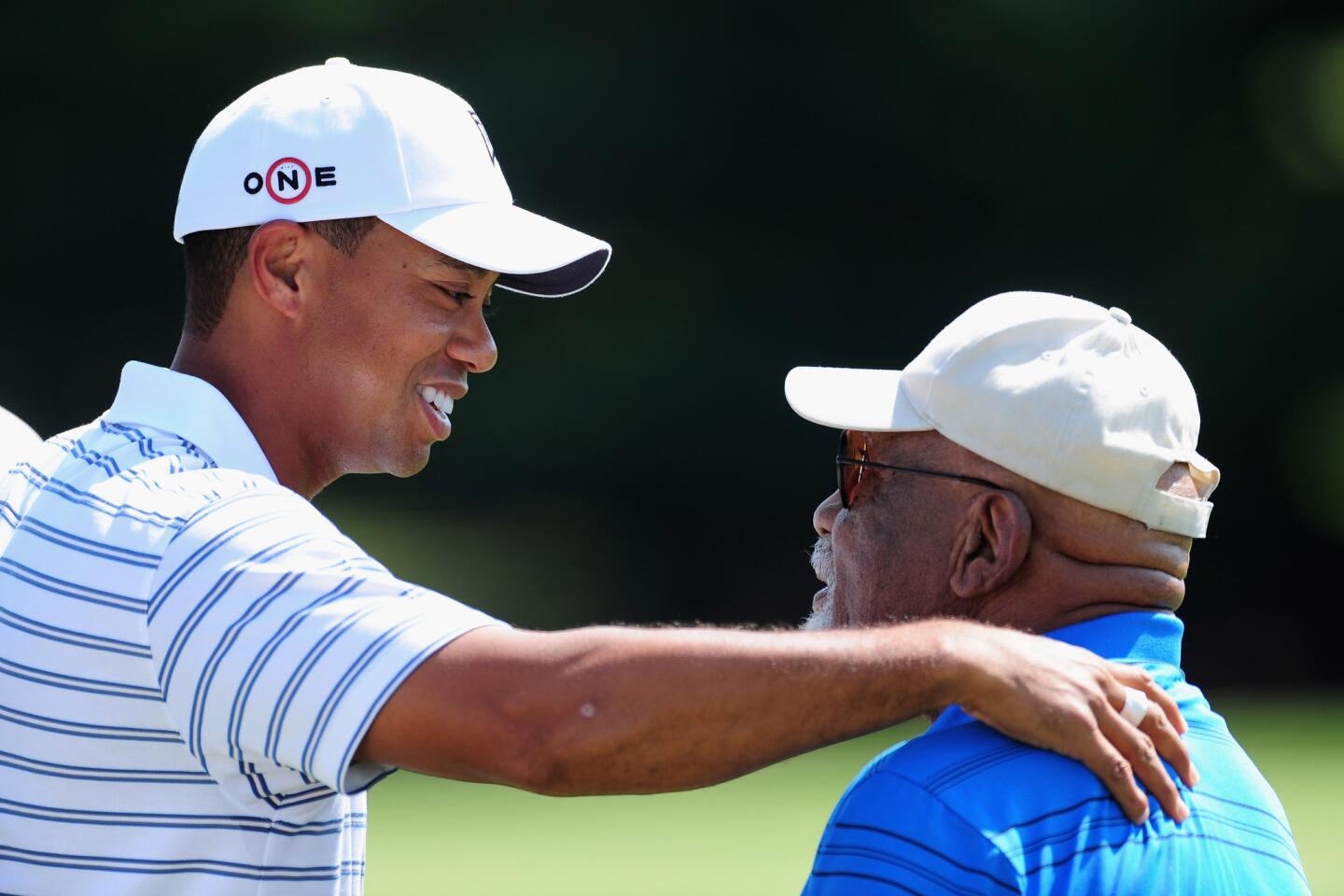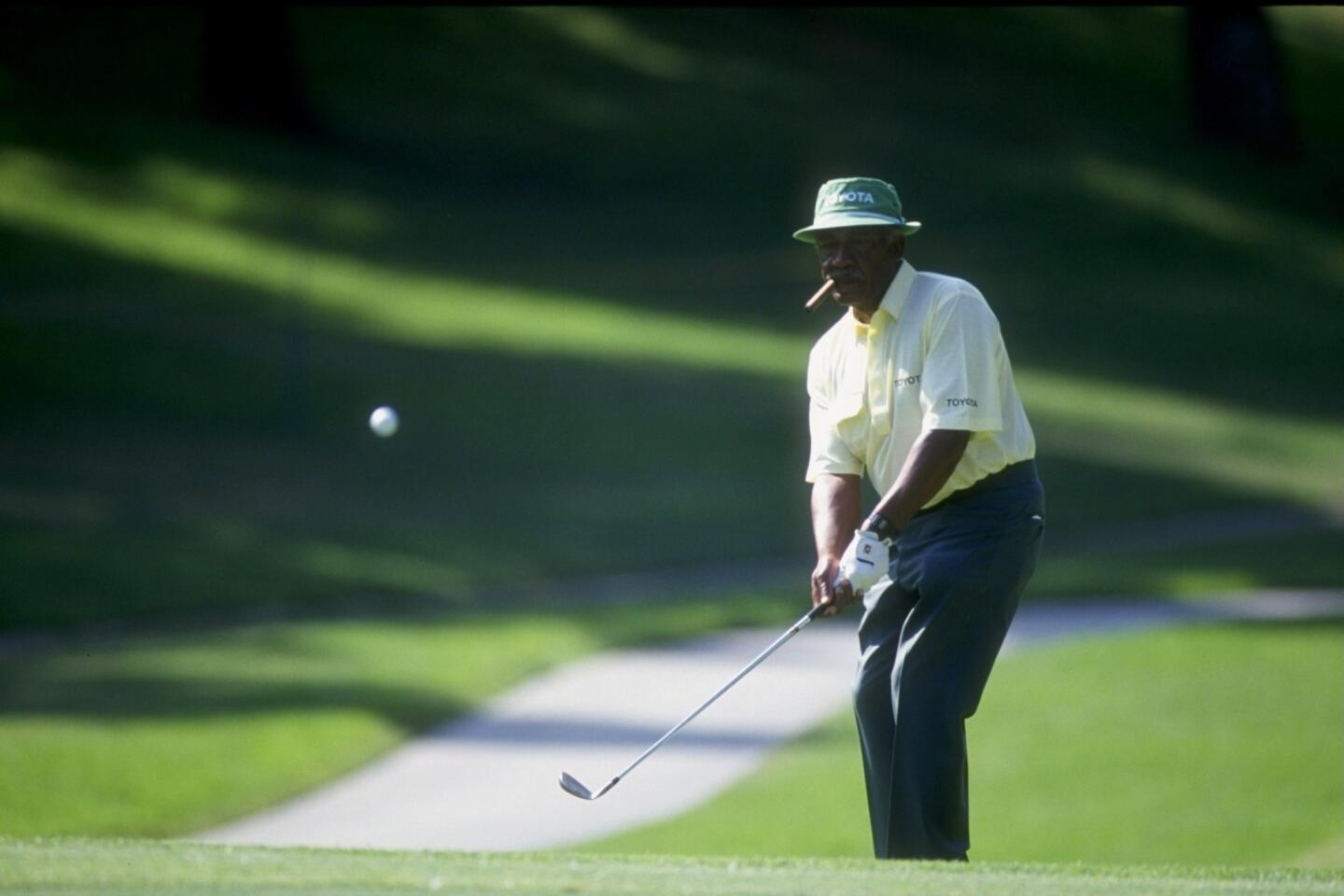Charlie Sifford dies at 92; ‘Jackie Robinson of golf’ braved death threats
- Share via
In one of golfer Charlie Sifford’s first events as a member of the professional tour, he was heckled by white spectators — one even kicked his ball off the fairway and covered it with beer cans — in his home state of North Carolina.
That night, an anonymous caller advised him not to show up for the second round.
“Whatever you’re going to do,” Sifford replied on that night in 1961, “you’d better be ready at 9:20. Because that’s when I’m going to be out there on the first tee.”
Golf was more than a game for Sifford, who, at age 39, became the first black player to earn a Professional Golfers Assn. of America membership card. His determination to climb over the whites-only wall that surrounded professional golf at the time — an effort set in motion by an insistent California attorney general — helped clear the way for generations of minority players.
On Tuesday, Sifford died in Cleveland at 92 after a recent stroke. President Obama praised Sifford on Wednesday, saying he had faced “indignity and injustice even as he faced the competition” and helped to alter “the course of the sport and the country he loved.”
Known as much for his short swing as his short answers to interviewers’ questions, the cigar-chomping Sifford was commonly referred to as “the Jackie Robinson of golf,” an appellation he viewed with a jaundiced eye.
“If I was the Jackie Robinson of golf, I sure didn’t do a very good job of it,” he often said. “Jackie was followed by a hundred great black ballplayers. I was followed by no one.”
While Sifford opened the door, the number of African American golfers who followed was, as he suggested, relatively small. The most famous, Tiger Woods, on Wednesday called Sifford “the grandpa I never had.”
But Sifford also paved the way for other minority golfers, who now include tour stars Vijay Singh of Fiji and South Korean K.J. Choi.
“Without Charlie Sifford, there would have been no one to fight the system,” Lee Elder, the first African American to play in the Masters in 1975, said in an interview later with the New York Times. “It took a special person to take the things he took — the tournaments that barred him, the black cats in his bed, the hotels where he couldn’t stay, the country club grills where he couldn’t eat.”
“Myself, I don’t think I could have taken it because I’m a little too thin-skinned,” Elder said. “Charlie was tough and hard.”
Which was precisely what he needed to be, for what he couldn’t do with his talent, he did with his gumption, finally getting his tour card at 39, well past any athlete’s prime age. Even so, he won twice on the PGA Tour — one of those victories was at the 1969 Los Angeles Open at Rancho Park Golf Course — twice on the senior tour, consistently finished seasons among the 60 top money winners, was the first black player enshrined in the World Golf Hall of Fame in 2004 at St. Augustine, Fla., and in 2008 was honored as that year’s Ambassador of Golf. In 2014, he was a recipient of the Presidential Medal of Freedom, the highest civilian honor bestowed by the nation.
“I really would like to know how good I could have been with a fair chance,” he pondered from time to time. “I loved the game, and I had a gift, but I had too much pressure. I will never know.”
It wasn’t so complicated at the beginning. Born in Charlotte, N.C., on June 2, 1922, Sifford was working as a caddie at the Carolina Country Club, out-earning his father at 60 cents a day, when he was 10, and playing the course on Mondays, when the club was closed to members, or whenever he could sneak in a few holes on other days.
Hence, his short swing: “I was always moving fast to keep from being thrown off the course. I never learned how to take my time ... and develop a decent stroke.”
Still, he was shooting par golf — and smoking cigars — by the time he was 13. At 17, Sifford was taken aside by Carolina Club owner Sutton Alexander, who told him it would probably be best if he stayed away from the club.
“I had gotten too good and the members didn’t like it,” Sifford told the Atlanta Constitution. “Mr. Alexander was concerned about my physical well-being.”
So Sifford headed north to Philadelphia, where he had relatives, and spent the next four years working in a biscuit bakery and hustling golf at Cobbs Creek, a public course open to black players. Then it was off to the Army for service in the Pacific — he fought on Okinawa — during World War II, and when the 26-year-old Sifford returned to the States, it was with the firm desire to become a pro golfer.
In 1943, however, while Sifford was serving his country, the PGA of America, which ran the pro golf tour at the time, had inserted a “Caucasians only from North or South America” into its rules for membership. Thus, when Sifford applied, he was denied on the grounds that he wasn’t Caucasian. And when he tried to enter PGA-sponsored tournaments, he was denied because he wasn’t a member.
Sifford was determined, though, and kept picking away. He played — and won six national titles — on a circuit set up by other black golfers, and spent several years as a personal coach and assistant to singer-bandleader Billy Eckstine, playing wherever and whenever he could in the few PGA events that accepted non-whites.
“I went to Jackie [Robinson] and told him what I wanted to do,” Sifford often recalled. “He asked me if I was a quitter. I told him I wasn’t a quitter and he told me to go ahead and take the challenge.”
And it was a challenge. In 1952, playing in the Phoenix Open on an invitation obtained through former heavyweight boxing champion Joe Louis, Sifford, Louis and their all-black foursome arrived at the green on the first hole and found the cup filled with human excrement. They had to wait an hour for the cup to be replaced.
At another tournament, again playing on an invitation, Sifford made a hole in one, which, it had been advertised, brought with it a new car and a cash prize. Somehow, though, the offer had been withdrawn, it was determined, just before Sifford teed off.
And always, there were hecklers yelling racial insults, kicking his ball into the rough, shouting death threats. Sifford ignored them as best he could, and played the best he could.
In 1955, at the Canadian Open, one of those tournaments that welcomed non-whites, Sifford led the first round after shooting a 63. That put him a stroke ahead of Arnold Palmer. Palmer went on to win, but Sifford showed in that tournament that he could play with the best.
In 1957, he won the Long Beach Open, and although it was not a tour event, it was co-sponsored by the PGA of America and included a number of name white pros.
Finally, in 1960, the PGA gave in and issued Sifford an “approved player” card. It wasn’t membership, but it allowed him to play in whatever tour events he could qualify for. And then, in 1961, under a threat by Stanley Mosk, then California attorney general and later state Supreme Court justice, to bar the tour from the state, the PGA caved in all the way, removing the “Caucasians only” clause from membership requirement.
Sifford is often credited with having been the first African American to win on the tour, but it didn’t happen that way. Pete Brown, who took advantage of Sifford’s pioneering and joined the tour when the offending clause was removed, beat Sifford to the punch, winning the 1964 Waco Turner Open in Burneyville, Okla. Sifford broke through three years later in Connecticut, winning the 1967 Greater Hartford Open. He was 45.
“Charlie birdied, not talked, his way through social prejudice,” Pulitzer Prize-winning columnist Jim Murray wrote in The Times in 1969. “He broke barriers by breaking par. His weapon was a 9-iron, not a microphone. Charlie stands as a social pioneer not because he could play politics, but because he could play golf.”
In 2009, 40 years after Sifford won the L.A. Open, the tournament organizers established in his honor a sponsor’s exemption for a minority golfer who otherwise would not have been eligible to play in the event.
On Wednesday, Woods credited Sifford for the opportunity to chase a career that now includes 79 PGA Tour wins and 14 major championships.
Without Sifford, Woods said, “I probably wouldn’t be here. My dad would never have picked up the game. Who knows if the clause would still exist or not? But he broke it down.”
Sifford was preceded in death by Rose, his wife of 51 years. Among his survivors are sons Charles Jr. and Craig and three grandchildren.
Twitter: @nathanfenno
Kupper is a former Times staff writer.
Times staff writer Chris Dufresne contributed to this report.
More to Read
Start your day right
Sign up for Essential California for the L.A. Times biggest news, features and recommendations in your inbox six days a week.
You may occasionally receive promotional content from the Los Angeles Times.











